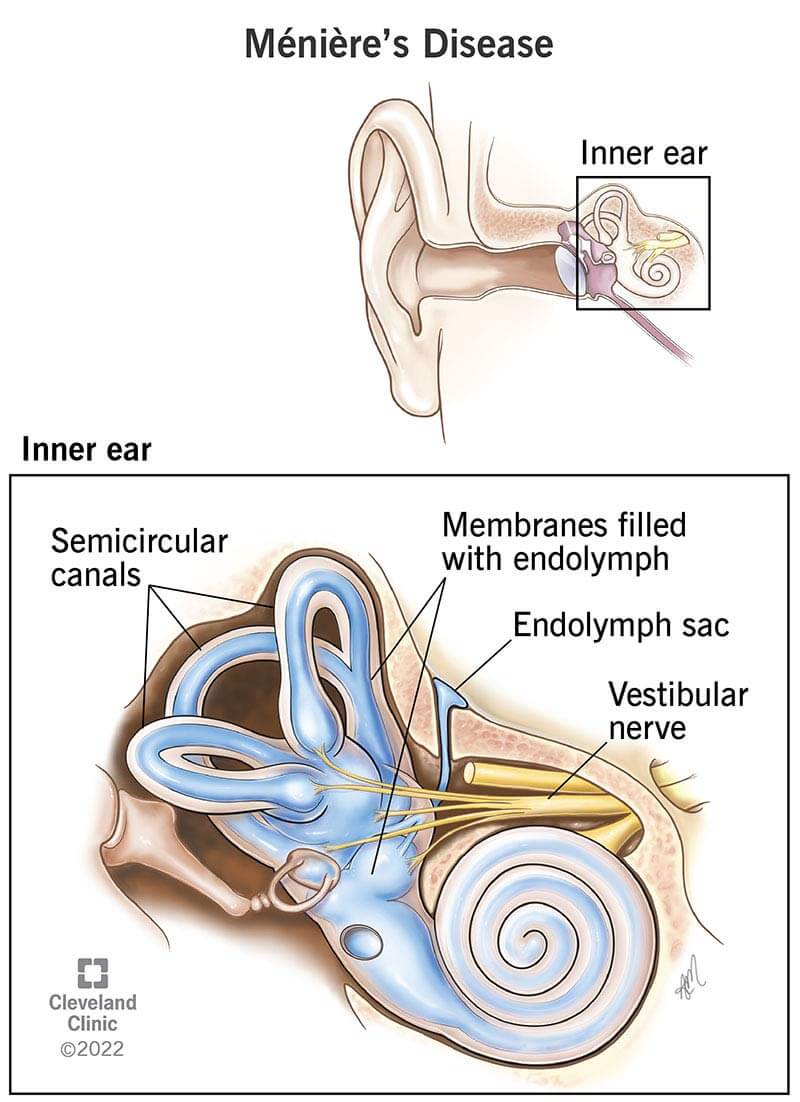A nurse is planning care for a client who has Ménière’s disease and is experiencing episodes of vertigo. Which of the following interventions should the nurse include in the plan?
Maintain strict bed rest.
Restrict fluid intake to the morning hours.
Administer aspirin.
Provide a low-sodium diet.
The Correct Answer is D
Choice A Reason
Maintain strict bed rest. This intervention is not typically recommended for managing Ménière’s disease. While rest during acute vertigo episodes is important, strict bed rest is not necessary and can lead to other complications such as muscle atrophy and decreased mobility.
Choice B Reason
Restrict fluid intake to the morning hours. This statement is incorrect. Fluid intake should be evenly distributed throughout the day to help manage the symptoms of Ménière’s disease. Restricting fluids to the morning hours can lead to dehydration and does not effectively manage the condition.
Choice C Reason
Administer aspirin. This intervention is not recommended for Ménière’s disease. Aspirin can worsen tinnitus, a common symptom of Ménière’s disease, and is generally avoided in these patients.
Choice D Reason
Provide a low-sodium diet. This is the correct intervention. A low-sodium diet helps reduce fluid retention in the body, which can decrease the pressure in the inner ear and help manage the symptoms of Ménière’s disease. Reducing sodium intake to 1,500-2,000 milligrams per day is often recommended.

Nursing Test Bank
Naxlex Comprehensive Predictor Exams
Related Questions
Correct Answer is C
Explanation
Choice A Reason
“You are not contagious when lesions are healed.” This statement is incorrect. Genital herpes can still be contagious even when there are no visible lesions. The virus can be shed from the skin and transmitted to others even in the absence of symptoms.
Choice B Reason
“This infection is spread through the air.” This statement is incorrect. Genital herpes is not spread through the air. It is primarily transmitted through direct skin-to-skin contact, particularly during sexual activity.
Choice C Reason
“Stress can activate an outbreak.” This statement is correct. Stress is a known trigger for reactivation of the herpes simplex virus, leading to outbreaks of genital herpes. Other triggers can include illness, fatigue, and immune suppression.
Choice D Reason
“Antiviral drugs will cure the infection.” This statement is incorrect. While antiviral drugs can help manage symptoms and reduce the frequency of outbreaks, they do not cure the infection. The herpes simplex virus remains in the body and can reactivate.
Correct Answer is D
Explanation
Choice A Reason
“Your provider will use stool from your digital rectal examination to perform the test.” This statement is incorrect. For fecal occult blood testing, stool samples are typically collected at home using a special kit provided by the healthcare provider. The samples are then sent to a lab for analysis. Using stool from a digital rectal examination is not the standard procedure for FOBT.
Choice B Reason
“Your provider will prescribe a stimulant laxative prior to the procedure to evacuate the bowel.” This statement is incorrect. Stimulant laxatives are not typically prescribed before an FOBT. The test requires a small sample of stool, and using a laxative could interfere with the results. Patients are usually advised to follow specific dietary and medication guidelines to avoid false positives or negatives.
Choice C Reason
“You should begin annual fecal occult blood testing for colorectal cancer screening at 40 years old.” This statement is incorrect. Current guidelines recommend starting colorectal cancer screening, including FOBT, at age 45 for individuals at average risk. Screening may start earlier for those with a higher risk, such as a family history of colorectal cancer.
Choice D Reason
“You should avoid taking corticosteroids prior to testing.” This is the correct statement. Corticosteroids can cause gastrointestinal irritation and bleeding, which may lead to false-positive results in fecal occult blood tests. Therefore, it is important to avoid these medications before testing.
Whether you are a student looking to ace your exams or a practicing nurse seeking to enhance your expertise , our nursing education contents will empower you with the confidence and competence to make a difference in the lives of patients and become a respected leader in the healthcare field.
Visit Naxlex, invest in your future and unlock endless possibilities with our unparalleled nursing education contents today
Report Wrong Answer on the Current Question
Do you disagree with the answer? If yes, what is your expected answer? Explain.
Kindly be descriptive with the issue you are facing.
